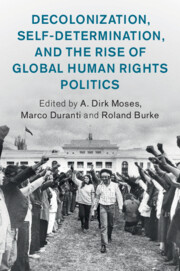Book contents
- Decolonization, Self-Determination, and the Rise of Global Human Rights Politics
- Human Rights in History
- Decolonization, Self-Determination, and the Rise of Global Human Rights Politics
- Copyright page
- Contents
- Notes on Contributors
- Acknowledgments
- Introduction
- Part I Anti-Colonial Struggles and the Right to Self-Determination
- Part II Postcolonial Statehood and Global Human Rights Norms
- 6 Cutting Out the Ulcer and Washing Away the Incubus of the Past
- 7 Codifying Minority Rights
- 8 Between Ambitions and Caution
- 9 “From This Era of Passionate Self-Discovery”
- 10 Reentering Histories of Past Imperial Violence
- Part III Colonial and Neocolonial Responses
- Index
9 - “From This Era of Passionate Self-Discovery”
Norman Manley, Human Rights, and the End of Colonial Rule in Jamaica
from Part II - Postcolonial Statehood and Global Human Rights Norms
Published online by Cambridge University Press: 24 June 2020
- Decolonization, Self-Determination, and the Rise of Global Human Rights Politics
- Human Rights in History
- Decolonization, Self-Determination, and the Rise of Global Human Rights Politics
- Copyright page
- Contents
- Notes on Contributors
- Acknowledgments
- Introduction
- Part I Anti-Colonial Struggles and the Right to Self-Determination
- Part II Postcolonial Statehood and Global Human Rights Norms
- 6 Cutting Out the Ulcer and Washing Away the Incubus of the Past
- 7 Codifying Minority Rights
- 8 Between Ambitions and Caution
- 9 “From This Era of Passionate Self-Discovery”
- 10 Reentering Histories of Past Imperial Violence
- Part III Colonial and Neocolonial Responses
- Index
Summary
In January 1961, Jamaica was a member of the West Indies Federation consisting of ten Caribbean islands. By 1964, Jamaica was an independent island state and recognized at the UN as a global leader in the human rights field after having abandoned the Federation in 1962. This chapter argues Jamaica presents an early example of the integration of human rights and development, normally dated to the late 1980s, and that Jamaica’s process of ending empire shaped the postcolonial world in surprising ways. It focuses on both the domestic and the international dimensions of Jamaica's human rights enterprise. Norman Manley’s period in government from 1955 to 1962, and its new practice and philosophy of societal planning, nurtured an emphasis on both human rights and decolonization. Manley’s nation and state-building project would go on to shape transformative work of Jamaica at the UN during the 1960s when Manley’s protégé Egerton Richardson – who from 1956 to 1962 had been closely associated with the planning work – refashioned international human rights work.
- Type
- Chapter
- Information
- Publisher: Cambridge University PressPrint publication year: 2020



